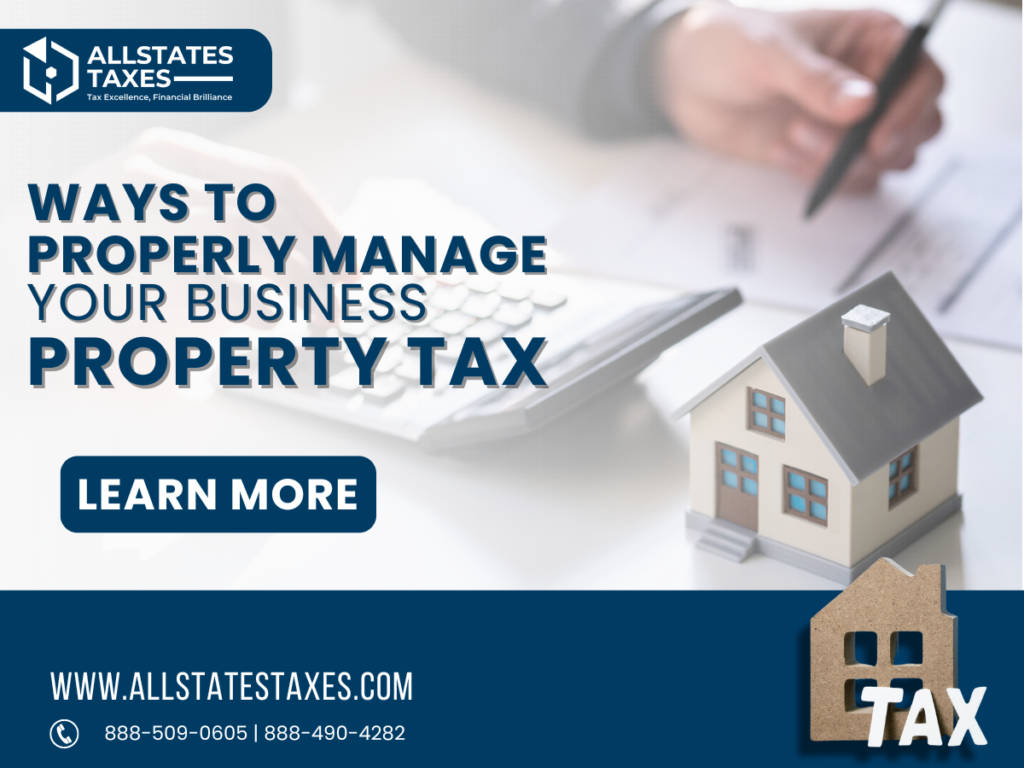Navigating the complexities of business property tax can be overwhelming, but with the right strategies, you can effectively manage these obligations and ensure your business remains financially healthy. Proper management of business property tax requires a deep understanding of tax regulations, accurate property valuation, and strategic planning. In this article, we’ll explore key approaches to managing your business property tax effectively.
Introduction to Business Property Tax
Managing business property tax is crucial for any business owner who owns or leases commercial real estate. This tax, based on the value of your property, can significantly impact your operating costs. Thus, understanding and managing this tax efficiently is key to ensuring your business remains profitable.
Understanding Your Business Property Tax Bill
To manage your business property tax effectively, it’s important to understand the components of your tax bill. The bill is typically composed of several factors, including the assessed value of your property, the tax rate, and any applicable exemptions. Understanding how these components interact will help you anticipate and manage your tax liabilities.
Key Components of a Property Tax Bill
A typical property tax bill includes the assessed value of the property, the tax rate applied, and any exemptions or credits that may apply. The assessed value is determined by your local tax authority and reflects the estimated market value of your property. This value is then multiplied by the tax rate, which is set by local governments, to determine your total tax liability.
How Property Taxes Are Assessed
Property taxes are assessed based on the value of your property. Local tax assessors evaluate your property’s market value and apply the local tax rate to this value. The assessment process may involve physical inspections, analysis of property sales data, and other methods to determine your property’s value.
Common Mistakes to Avoid
One of the most common mistakes businesses make is failing to regularly review their property tax assessments. Over time, property values can fluctuate, and if your property’s assessed value is not accurate, you could be overpaying or underpaying taxes. Additionally, not taking advantage of available exemptions or credits can result in higher tax liabilities.
The Importance of Accurate Property Valuation
Accurate property valuation is the cornerstone of effective property tax management. An incorrect valuation can lead to overpayment or underpayment of taxes, both of which can have significant financial consequences for your business.
Methods for Property Valuation
Property valuation can be conducted through various methods, including the sales comparison approach, cost approach, and income approach. Each method has its strengths and is suitable for different types of properties. For commercial properties, the income approach, which considers the income generated by the property, is often the most relevant.
Benefits of a Correct Property Valuation
Ensuring your property is accurately valued can prevent overpaying taxes and free up resources for other business needs. It also reduces the risk of underpayment, which could lead to penalties and interest charges.
Risks of Overvaluation or Undervaluation
Overvaluation of your property can result in unnecessarily high tax bills, straining your cash flow. On the other hand, undervaluation can lead to underpayment of taxes, which might result in penalties and legal issues down the line. Regularly reviewing and, if necessary, challenging your property’s assessed value is crucial to maintaining tax efficiency.
Strategies to Reduce Your Business Property Tax
Reducing your business property tax doesn’t have to be complicated. By taking a proactive approach, you can identify opportunities to lower your tax bill and keep more money in your business.
Regularly Review Property Assessments
One of the simplest ways to reduce your property tax is to regularly review your property assessments. If you notice any discrepancies, such as incorrect property details or overvaluation, you can challenge the assessment and potentially lower your tax liability.
Explore Tax Incentives and Exemptions
Many local governments offer tax incentives and exemptions for businesses that meet certain criteria, such as making energy-efficient improvements or creating jobs. Researching and applying for these incentives can significantly reduce your property tax bill.
Negotiate with Local Tax Authorities
In some cases, you may be able to negotiate with your local tax authorities to reduce your property tax liability. This could involve presenting evidence that your property has been overvalued or highlighting changes in the local market that have reduced property values.
Hiring a Property Tax Consultant
Managing business property tax can be complex, and sometimes it’s best to seek professional help. A property tax consultant can provide valuable expertise and help you navigate the intricacies of property tax regulations.
When to Consider Hiring a Consultant
If your property tax bill is significant or if you’ve experienced recent changes in your property’s value, it might be time to hire a consultant. These professionals can provide a thorough review of your tax assessments and identify potential savings opportunities.
How to Choose the Right Consultant
When choosing a property tax consultant, look for someone with experience in your industry and a track record of successful appeals. It’s also important to consider their fee structure; some consultants work on a contingency basis, which means they only get paid if they save you money.
Costs vs. Benefits of a Property Tax Consultant
While hiring a property tax consultant involves an upfront cost, the potential savings can far outweigh this expense. A good consultant can reduce your property tax liability by identifying errors in your assessment or by helping you qualify for exemptions and incentives.
Appealing Your Property Tax Assessment
If you believe your property has been overvalued, appealing the assessment can be an effective way to lower your tax bill. However, the appeals process can be complex and requires careful preparation.
Steps to Appeal a Property Tax Assessment
The first step in appealing your property tax assessment is to gather evidence that supports your case. This might include recent sales data for comparable properties, an independent appraisal, or evidence of errors in the assessor’s report. Once you’ve compiled your evidence, you’ll need to submit a formal appeal to your local tax authority.
How to Build a Strong Case to Manage Business Property Tax
Building a strong case for your appeal involves providing clear, compelling evidence that your property has been overvalued. This might include documentation of changes in the local market, errors in the assessment process, or any other factors that could justify a lower valuation.
What to Expect During the Appeal Process
The appeal process typically involves a hearing where you’ll present your evidence to a review board. The board will consider your case and decide whether to adjust your property’s assessed value. If successful, your property tax bill will be adjusted accordingly.
Tax Planning and Long-Term Strategies
Effective management of your business property tax is not just about short-term savings; it’s also about long-term planning. By integrating tax planning into your overall business strategy, you can ensure that your tax liabilities are minimized over the long term.
Integrating Tax Planning into Business Strategy
Integrating tax planning into your business strategy involves regularly reviewing your property tax assessments, staying informed about changes in tax laws, and planning for future changes in property value. This proactive approach can help you avoid unexpected tax liabilities and ensure that your business remains financially healthy.
Long-Term Benefits of Proactive Tax Management
Proactively managing your business property tax can result in significant long-term savings. By regularly reviewing your property’s assessed value and taking advantage of available exemptions and incentives, you can reduce your tax liability and improve your business’s cash flow.
Leveraging Technology for Manage Business Property Tax
Technology can play a key role in managing your business property tax. Many software solutions are available that can help you track property values, monitor tax assessments, and identify savings opportunities. By leveraging these tools, you can streamline your tax management process and ensure that you’re always on top of your obligations.
The Role of Local Tax Laws in Business Property Tax
Local tax laws play a crucial role in determining your property tax liability. Understanding these laws and staying informed about changes can help you manage your tax obligations more effectively.
Understanding Local Tax Laws
Local tax laws vary significantly from one jurisdiction to another, and these laws can have a major impact on your property tax liability. It’s important to understand the specific tax laws in your area and how they apply to your property.
How Local Tax Laws Affect Your Property Tax
Local tax laws determine the tax rate applied to your property’s assessed value, as well as any exemptions or incentives that may be available. Understanding these laws can help you identify opportunities to reduce your tax liability and ensure that you’re in compliance with all regulations.
Staying Updated on Changes in Tax Laws
Tax laws are constantly evolving, and staying informed about changes is crucial for effective tax management. Regularly reviewing local tax laws and consulting with a tax professional can help you stay ahead of any changes that could impact your property tax liability.
The Impact of Business Property Tax on Cash Flow
Business property tax can have a significant impact on your cash flow, especially if your tax bill is high. Managing your tax obligations effectively is crucial for maintaining healthy cash flow and ensuring the long-term success of your business.
How Property Taxes Affect Business Cash Flow
Property taxes are a significant expense for many businesses, and if not managed properly, they can strain your cash flow. Regularly reviewing your tax assessments and planning for tax payments in advance can help you manage this expense more effectively.
Strategies to Mitigate Cash Flow Issues
One effective strategy for mitigating cash flow issues related to property tax is to set aside funds throughout the year specifically for tax payments. This can help you avoid large, unexpected expenses and ensure that you’re always prepared when your tax bill comes due.
The Importance of Cash Flow Forecasting
Cash flow forecasting is an essential tool for managing your business property tax. By regularly forecasting your cash flow, you can anticipate tax payments and ensure that you have the necessary funds available when they’re due. This proactive approach can help you avoid cash flow shortages and maintain the financial health of your business.
FAQs about Managing Business Property Tax
What is the deadline for property tax payments?
The deadline for property tax payments varies depending on your local tax authority. It’s important to check with your local government to ensure that you’re aware of the specific deadlines for your area.
Can property tax be deducted as a business expense?
Yes, property tax can typically be deducted as a business expense, reducing your overall taxable income. However, it’s important to consult with a tax professional to ensure that you’re deducting the correct amount.
What are the common property tax exemptions available?
Common property tax exemptions include those for businesses that make energy-efficient improvements, create jobs, or operate in certain industries. Researching and applying for these exemptions can help reduce your tax liability.
How often should I review my property tax assessment?
It’s a good idea to review your property tax assessment annually. This will help ensure that your property is accurately valued and that you’re not overpaying on your taxes.
What should I do if I miss Manage Business Property Tax payment?
If you miss a property tax payment, it’s important to contact your local tax authority as soon as possible. They may offer payment plans or other options to help you catch up on your payments.
Is it worth appealing a property tax assessment?
If you believe that your property has been overvalued, it’s often worth appealing the assessment. A successful appeal can result in significant tax savings and help improve your business’s cash flow.
Conclusion
Properly managing your business property tax is essential for maintaining the financial health of your business. By understanding your tax bill, ensuring accurate property valuations, exploring tax incentives, and considering professional help when necessary, you can effectively manage your tax obligations and keep your business on solid financial footing. Remember, proactive management and regular reviews are key to minimizing your tax liability and ensuring long-term success.



